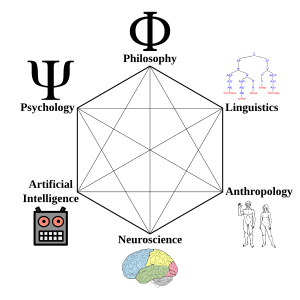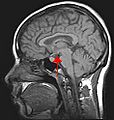Cognitive science facts for kids

Cognitive science is a fascinating field that explores how our minds work. It looks at how we think, learn, remember, and understand the world around us. Imagine trying to figure out how your brain creates ideas or solves problems – that's what cognitive scientists do!
This science brings together ideas from several different areas of study. These include:
- Psychology: The study of the mind and behavior.
- Neuroscience: The biological study of the brain and nervous system.
- Computer science: How computers work and how we can create intelligent programs.
- Linguistics: The study of language and how we use it.
Cognitive science isn't just a mix of these fields. It's where they meet to solve big questions about the mind. It often sees the world outside our minds as something real and separate, just like other sciences do.
What Does "Cognitive" Mean?
The word "cognitive" in "cognitive science" refers to any mental process or structure that can be studied carefully. This includes things like thinking, paying attention, remembering, and even how we make decisions.
Think of it as anything related to how we "know" or "understand" things. It's a very broad term that covers many different ways our minds work.
How Does Philosophy Fit In?
Many cognitive scientists believe in something called a functionalist view of the mind. This means they think that intelligence and thinking aren't just tied to human brains. They believe that other animals, or even very advanced computer systems, could also have minds or intelligence.
This idea is one reason why cognitive science is different from just psychology or neuroscience alone. It opens the door to studying intelligence in many forms, not just in people.
Images for kids
-
Image of the human head with the brain. The arrow indicates the position of the hypothalamus.
See also
 In Spanish: Ciencia cognitiva para niños
In Spanish: Ciencia cognitiva para niños


